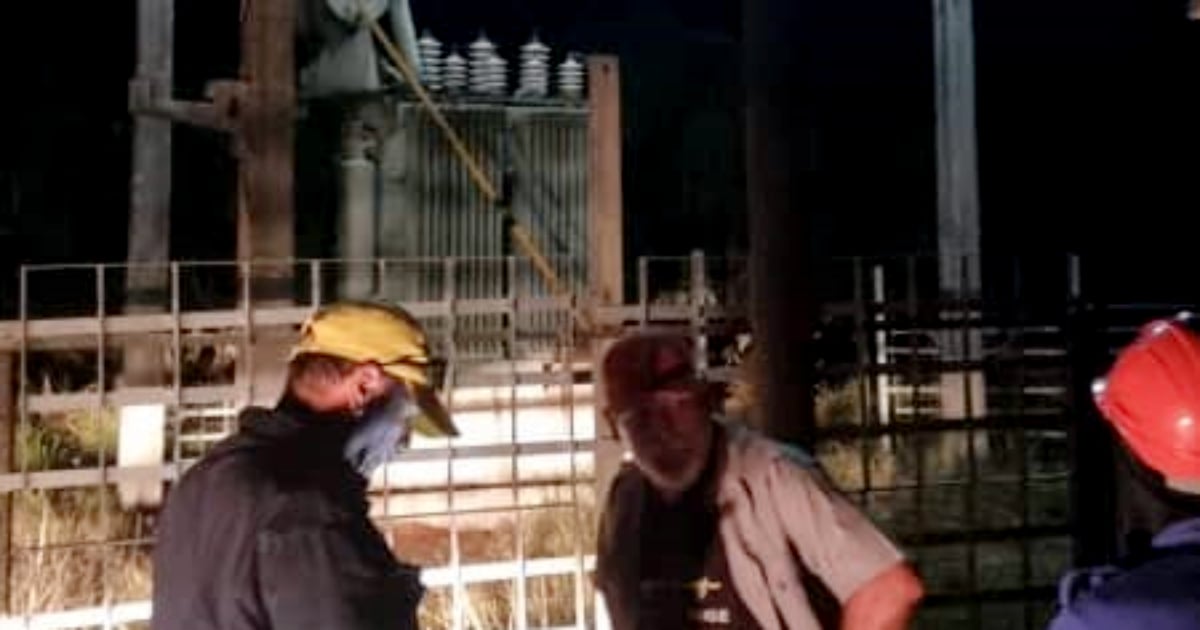In an astonishing display of hypocrisy, Cuba's Electric Union (UNE) recently condemned the theft of 2,000 liters of dielectric oil from a transformer in Ciego de Ávila with a statement that has sparked outrage among Cubans: "Don't profit from your people's welfare!" According to the UNE, this criminal act, which occurred on January 23 at the 33 kV transformer of the La Piña circuit, left 594 customers without power for more than 21 hours and necessitated the mobilization of material and human resources. On its social media, the state-run company labeled the theft a "sabotage" of the electrical system and celebrated the capture of those responsible.
However, the anger isn't directed at the crime itself, but at the audacity with which the UNE positions itself as a defender of the "people's welfare" when it is, in fact, the primary source of their discontent. The irony is blatant: the same entity that subjects millions of Cubans to endless blackouts, fails to ensure a reliable basic service, and is part of an inefficient state monopoly, dares to speak of "welfare."
For years, Cuba has been engulfed in an energy crisis that has turned power outages into a daily ordeal. Rather than taking responsibility, the UNE justifies its failure with recycled excuses: "technical failures," "scheduled maintenance," "fuel shortages," and now, "oil thefts." The real issue, however, lies in the dysfunction of a state structure incapable of modernizing the country's outdated electrical system.
The Double Standard of Official Rhetoric
The UNE's message also reflects the double standard of the official narrative. While the theft of electrical components is indeed a crime, it is also true that many of these offenses are a direct result of the poverty into which the regime has plunged the population. Without access to decent wages, reliable public services, or prospects for improvement, desperation drives many Cubans to seek alternatives outside the law.
So, what "welfare" is the UNE referring to? In a country where food is scarce, hospitals lack medicines, and wages barely cover basic needs, does the state-run company really expect people to believe its monopoly provides "welfare" to the public?
While Cubans suffer from a lack of electricity, the regime's bureaucrats enjoy comforts and privileges unimaginable to the average citizen. Labeling dielectric oil thieves as the "enemies of the people" is merely a strategy to divert attention from the real issue: an inefficient government that has made poverty and scarcity the nation's default state. The real question is not who profits from the people's welfare, but rather: what welfare?
Context on Dielectric Oil Theft
The theft of dielectric oil has become one of the regime's recurring narratives to justify failures in the electrical system. In recent months, several reports have documented the rise of these incidents:
- In September 2024, the government blamed "transformer oil thieves" as the new excuse for prolonged blackouts in various provinces.
- At the end of the same month, the theft of 13,000 liters of dielectric oil was reported across several provinces.
- In November 2024, the regime vowed to "severely punish" those caught committing such crimes, reinforcing the narrative of sabotage.
- A month later, a suspected dielectric oil seller was reportedly detained in Santiago de Cuba.
- It all began in June when the UNE cited dielectric oil theft as one of the "main" reasons for electrical failures.
These events strengthen the notion that the regime uses such incidents as a distraction, without addressing the real root of the problem: structural inefficiency and a lack of investment in the country's electrical system.
Understanding Cuba's Energy Crisis
What are the main causes of Cuba's energy crisis?
The primary causes include an outdated electrical infrastructure, lack of investment, and the inefficiency of the state-run monopoly, which fails to provide reliable electricity services.
How does the UNE justify power outages?
The UNE often cites reasons such as "technical failures," "scheduled maintenance," "fuel shortages," and thefts of components like dielectric oil to justify power outages.
Why is the theft of dielectric oil significant in Cuba?
Dielectric oil theft is significant because it disrupts the electrical system, leading to blackouts. It is also used by the government as a narrative to shift blame from systemic inefficiencies.
What impact do power outages have on Cuban citizens?
Power outages severely impact daily life, affecting access to basic services, food preservation, healthcare, and overall quality of life for Cuban citizens.
